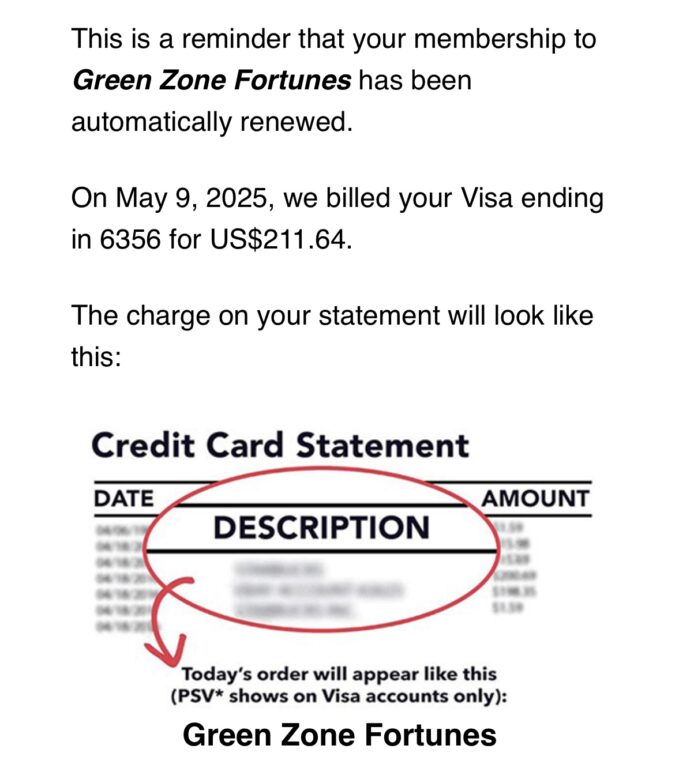Consumer Diary: Automatic Renewal, PCH, Hydrangeas

Audio By Carbonatix

This is one of my 5 hydrangea plants, from which I snipped off the old, dead flowers before discovering if that was a good idea. Photo credit: Harlan Levy
Consumer columnist and West Hartford resident Harlan Levy has more than 20 years of experience writing stories about everyday experiences that anyone could encounter.

Harlan Levy. Courtesy photo
By Harlan Levy
A lesson for an embarrassed consumer columnist …
Saturday morning, May 10, I found a surprising May 9 email telling me my $211 automatic renewal for my supposed subscription to Green Zone Financial was charged to my credit card.
“What the hell!” I said to my wife, who noticed it first on our joint-card email. “I never heard of it! And I never signed up for automatic renewal!”

Thus is the unpleasant surprise May 9 email that I opened on May 10, prompting me to file a fraud complaint. Courtesy of Harlan Levy
It must be fraud, I thought, and called up the credit card fraud department. The rep said I could file my complaint, which would be investigated. Meanwhile, she told me, I can get a $211 credit while the process unfolded. But, she said, she had to cancel my card. I have had that card for probably 15 years, and, not only had I memorized the number, but it was on automatic charge at many companies I buy stuff from.
Oh well, I thought, telling her to cancel it. I’ll get a new one in four to six days with a new number I’ll have to memorize and, unfortunately, many companies I’ll have to call to change the number.
Later Saturday my wife looked our account history to make sure I hadn’t subscribed to this website … and, to my dismay, she found a $55 charge on May 23, 2024, stating that it would automatically renew in a year.
Damn! Double damn! What a waste.
On Monday I canceled my subscription and called Green Zone to ask for a refund, citing my only defense: I’d been charged before the one-year automatic renewal date.
The Green Zone rep, Dan, said, the routine was to charge the automatic renewal a month prior to the one-year date to make sure it was in place. I politely (that’s the only way to act to get any results) asked him to do me a favour and give me the refund, because I had never opened one monthly dispatch since a year ago.
I was surprised that he went along. Yay for me!
I then called my credit card company to try to get the fraud investigation canceled. The rep said she’d put a note in my account, which, she said, already had the refund listed.
Lesson: Don’t sign up for a subscription without realising that automatic renewal is baked in unless you cancel well in advance of the renewal date. It’s up to you. I’ve reported on many automatic renewal situations, finding that it’s extremely hard to get it canceled and refunded. A scam subscription outfit won’t be amenable.
Lesson: Don’t sign up for automatic renewal unless you really mean it. And don’t forget to cancel a website as soon as you realize you’re not using it.
Hydrangeas
I’ve been wondering about my five hydrangea plants: To prune or not to prune. That is the question – whether to “deadhead” (snip) the dead blooms from last year or not to.
Before thinking about the issue, I had already impulsively cut off all the dead flowers. Then, on today’s walk around the block with our dog Latke, I passed the plentiful row of last year’s beautiful crop of a neighbor’s hydrangeas … with all the deadheads intact.

These are my neighbor’s hydrangeas – with the old flowers still uncut. Was that a good idea? Photo credit: Harlan Levy
Had I made a mistake?
So, I researched the issue and found:
- “You should ‘deadhead’ hydrangeas by removing dead blooms during the growing season, especially for varieties that bloom on new wood. This practice – deadheading – encourages more blooms and helps the plant focus its energy on root and foliage development. However, it’s best to stop deadheading in mid to late fall, leaving the spent blooms in place for winter interest and protection.”
- Another website said, “By removing spent flowers, the plant redirects its energy to produce new blooms rather than developing seeds … leading to a stronger, healthier plant. Removing unsightly dead blooms creates a more visually appealing display.”
Publishers Clearing House sweepstakes
Everybody I know has received the Publishers Clearing House Sweepstakes mailer announcing that they may have won BIG! And no one I know has won anything.
Now the Federal Trade Commission has taken action against its deceptive advertising, sending more than $18 million in refunds to consumers harmed by PCH’s misleading claims. PCH also agreed to make substantial changes to its ecommerce operations.
The FTC’s complaint charged:
- PCH targeted older and lower-income consumers, deceiving them into thinking either that consumers could not enter into sweepstakes without purchasing a product or that their chances of winning would be increased by purchasing products.
- PCH misled consumers by sending emails with deceptive subject lines that led consumers to believe the email was related to official documents, such as tax forms.
- PCH added deceptive shipping and handling fees and misrepresented that ordering was “risk-free,” even though consumers who wanted refunds had to return products at their own expense.
The FTC is sending checks to 281,724 affected consumers who ordered a product from Publishers Clearing House after receiving and clicking on one of the emails that the FTC alleged were deceptive.
Recipients should cash their checks within 90 days, as indicated on the check.
Now you know.
NOTE: If you have a consumer problem, contact me at [email protected] (“Consumer” in subject line), and, with the power of the press, maybe I can help.
Like what you see here? Click here to subscribe to We-Ha’s newsletter so you’ll always be in the know about what’s happening in West Hartford! Click the blue button below to become a supporter of We-Ha.com and our efforts to continue producing quality journalism.




Harlan, fully-detailed and quite thorough piece by Mike Rowe about this situation!…
https://youtu.be/g9UHhWUn50U?si=1ZMf9V_sayLSvBKL